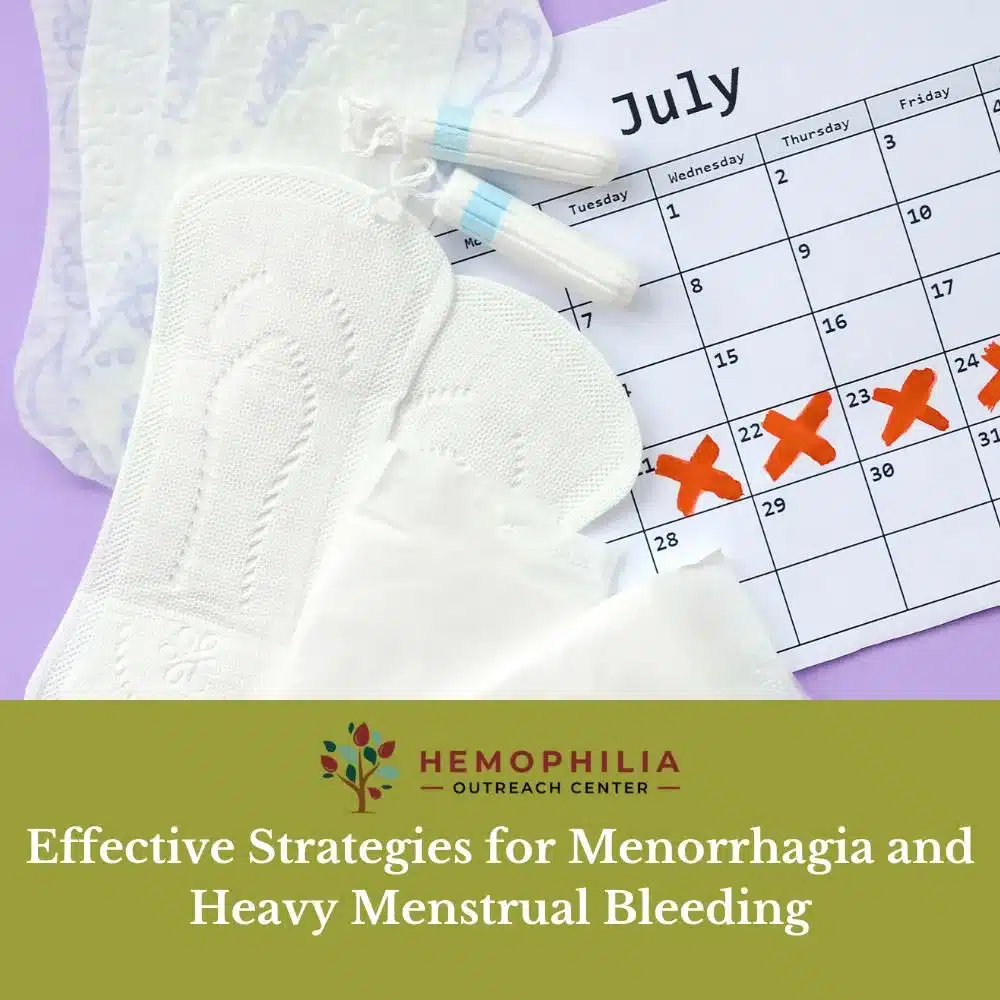Menorrhagia, commonly known as heavy menstrual bleeding, is a condition that poses a significant challenge to the well-being of many women, girls, and people who have or had the potential to menstruate or have the ability to menstruate (WGPPM). It goes beyond the inconvenience of a heavy period; menorrhagia is a medical condition characterized by excessive blood loss during menstruation that can severely impact a WGPPM’s physical health, emotional state, and quality of life.
This expanded guide delves into the nuances of managing menorrhagia, offering detailed insights into treatment options, understanding its impact, and highlighting the specialized support available at the Hemophilia Outreach Center (HOC) in Green Bay and Wausau.
Comprehensive Understanding of Menorrhagia
Menorrhagia manifests as bleeding that lasts more than seven days or is so heavy that it disrupts a WGPPM’snormal lifestyle. The condition might cause the need to change sanitary protection every 30 – 60 minutes or lead to symptoms of anemia, such as fatigue and shortness of breath.
Recognizing these symptoms early can prompt a timely intervention, which is crucial for effective management and treatment.
Detailed Look at Causes and Diagnostic Processes
The underlying causes of menorrhagia are diverse and can be attributed to a variety of factors, both hormonal and structural. Hormonal imbalances, particularly those related to disorders like polycystic ovary syndrome (PCOS), can disrupt the regular menstrual cycle and lead to heavy bleeding. Thyroid problems, particularly hypothyroidism, can also cause menorrhagia. On the structural side, physical conditions such as uterine fibroids or polyps are common culprits. These benign growths in the uterus can lead to increased menstrual flow and prolonged periods.
Other potential causes include adenomyosis, where the inner lining of the uterus breaks through the muscle wall of the uterus, and certain types of cancer, such as endometrial or cervical cancer, although these are less common. In some cases, the use of blood thinners or a lack of ovulation can lead to heavy menstrual bleeding as well.
To accurately diagnose menorrhagia, healthcare providers rely on a combination of patient history, physical examinations, and advanced diagnostic methods. Detailed blood tests are essential to check for anemia and other potential abnormalities, such as thyroid issues or clotting disorders. Pelvic ultrasounds can visualize the structure of the uterus and ovaries, identifying the presence of fibroids, polyps, or other abnormalities.
For a more detailed assessment, minimally invasive procedures like hysteroscopy may be employed. During a hysteroscopy, a thin, lighted tube is inserted into the vagina to examine the cervix and the inside of the uterus. This allows for direct visualization of the uterine cavity and can help in the diagnosis of intrauterine conditions that may cause heavy bleeding.
In some cases, an endometrial biopsy may be necessary to take a small sample of the uterine lining for further examination. This can help rule out endometrial hyperplasia or cancer, which can sometimes present with similar symptoms to menorrhagia.
This diagnostic precision is crucial as it ensures that the treatment plan is appropriately tailored to each individual’s condition. For instance, hormonal treatments may be effective for those with PCOS-related menorrhagia, while surgical options may be more suitable for those with fibroids or polyps.
The Hemophilia Outreach Center (HOC) in Green Bay and Wausau is equipped to provide comprehensive diagnostic evaluations for women experiencing menorrhagia. Our specialized care teams are dedicated to managing menorrhagia and other bleeding disorders, ensuring that patients receive the most effective and personalized care possible.

Immediate and Long-Term Management Strategies
When it comes to managing menorrhagia, immediate strategies are crucial for controlling acute bleeding and alleviating symptoms that can interfere with daily life. Medications are often the first line of defense, with tranexamic acid, a medication that promotes blood clotting, being a common choice.
For long-term management, hormonal treatments play a significant role. Oral contraceptives are widely prescribed to help regulate menstrual cycles and reduce the volume of bleeding. Progesterone therapies, including the levonorgestrel-releasing intrauterine system (LNG-IUS) (Mirena IUD), can also be effective in diminishing bleeding intensity and providing contraception.
However, when medication is not enough to provide relief or if a WGPPM prefers not to use hormonal treatments, surgical options may be explored if they are no longer interested in having children or past child-bearing age. Endometrial ablation, a procedure that destroys the lining of the uterus to reduce or stop bleeding, is a less invasive surgical option for those who wish to avoid a hysterectomy.
For more severe cases, a hysterectomy, which is the surgical removal of the uterus, may be considered as a definitive treatment for menorrhagia.

The Hemophilia Outreach Center (HOC) in Green Bay and Wausau is renowned for its comprehensive approach to women’s health, particularly in the management of bleeding disorders like menorrhagia. The HOC offers access to state-of-the-art treatments and a multidisciplinary team that includes gynecologists (that we coordinate with), hematologists, and other specialists dedicated to providing personalized care.
Patients can benefit from the latest medical advancements and a supportive environment that addresses both the physical and emotional aspects of living with menorrhagia.
For women who are navigating the complexities of menorrhagia, the HOC’s care teams provide not only medical interventions but also education on disease management that can improve symptoms. They emphasize the importance of regular medical follow-up and individualized treatment plans that are responsive to changes in symptoms and patient needs.
By offering a blend of immediate and long-term strategies, the HOC ensures that each patient receives a tailored approach to manage their menorrhagia effectively. For more detailed information on the services and support available, patients can visit the HOC’s dedicated pages for their Green Bay and Wausau care teams.
The Consequences of Ignoring Menorrhagia
The implications of untreated menorrhagia extend beyond physical health, potentially leading to severe anemia and significantly impairing a WGPPM’s quality of life. It underscores the importance of not only seeking treatment but also being vigilant about monitoring menstrual health. Regular consultations with healthcare providers can help manage the condition effectively and mitigate potential complications.
Emergency Situations and Menorrhagia
In scenarios where menorrhagia results in acute, heavy blood loss, emergency medical intervention might be necessary. Emergency departments are equipped to provide rapid treatments, such as intravenous medications, to stabilize the condition temporarily. These measures are crucial in preventing severe outcomes while paving the way for more definitive treatment solutions.
Wrapping It Up: A Call to Action for Women with Menorrhagia
Living with menorrhagia requires a proactive approach to health management, emphasizing the importance of early detection, comprehensive treatment planning, and ongoing support. The Hemophilia Outreach Center in Green Bay and Wausau exemplifies the kind of specialized care that can make a difference in the lives of women dealing with menorrhagia, offering resources, expertise, and a compassionate approach to care. This guide aims not only to inform but also to empower women to seek the help and support they need.
With the right strategies and resources, including those provided by specialized centers like HOC, women can navigate the challenges of menorrhagia and lead fulfilling lives. Remember, taking the first step towards seeking care is a pivotal move toward regaining control over your health and well-being.




